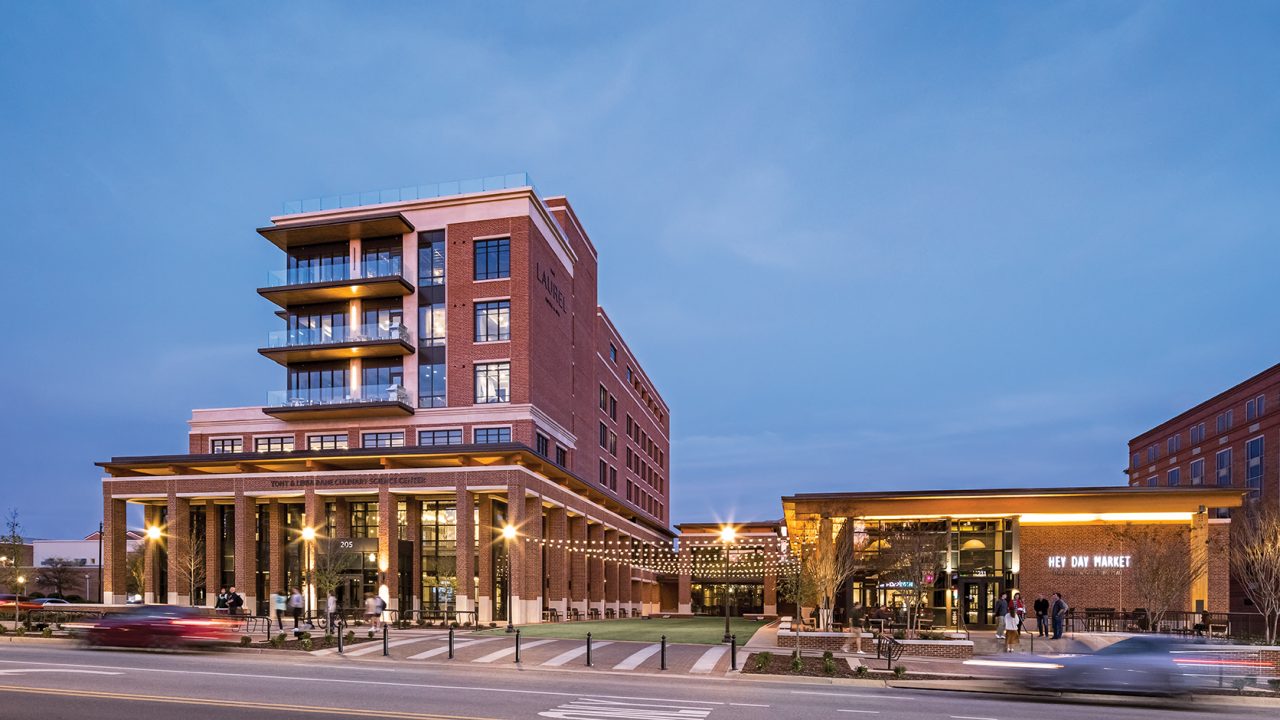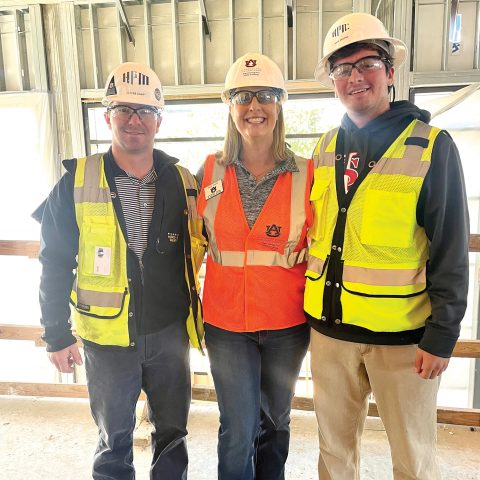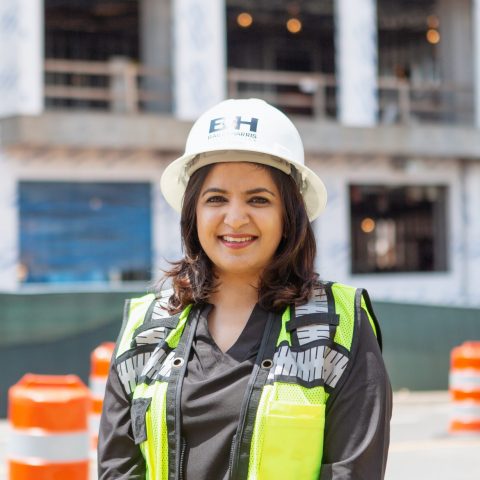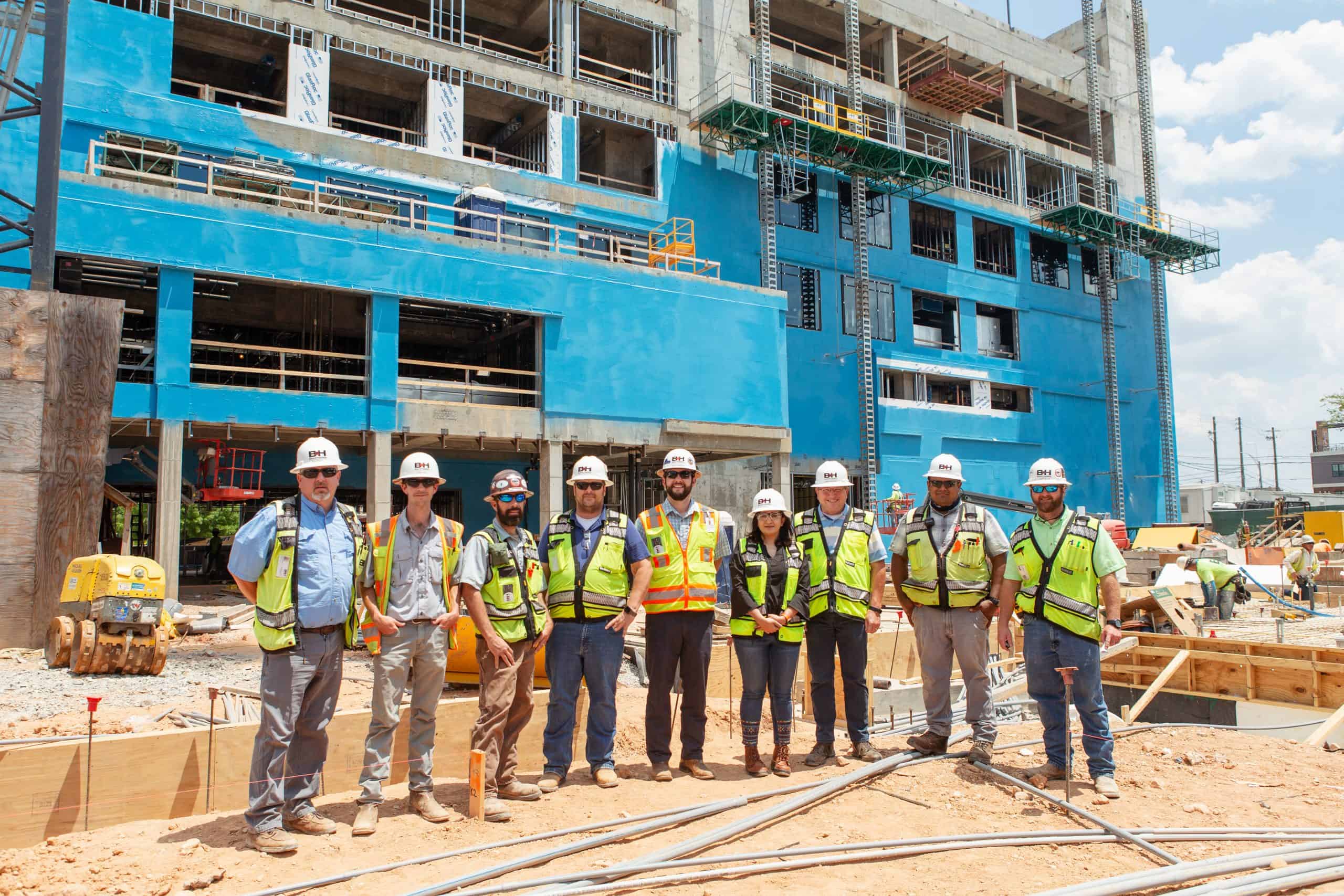BSCI Students and Alumni Work on New Culinary Science Center

The Tony and Libba Rane Culinary Science Center, Auburn's one-of-a-kind hospitality management education facility, was built from March 2020 through September 2022 at a cost of $110 million.
The 142,000 square-foot complex, designed by national architecture firm Cooper Carry, stands six stories tall at the corner of East Thach Avenue and South College Street where it combines education with real-life experience for students studying in the state’s only professionally accredited hospitality management program.
The building includes spaces for wine education, distilled spirits, a micro-brewery, a bakery and various training kitchens and lecture rooms as well as a teaching restaurant and teaching hotel and spa. The facility’s roof-top amenities include an event center, a garden and a pool. When the Rane Culinary Science Center opened in the fall of 2022, several students and alumni of the McWhorter School of Building Science (BSCI) were able to say they helped bring the building to life.
CALEB CAMP
Caleb Camp, a 2012 graduate of BSCI, is an Operations Manager with HPM, the firm that served as program manager on the Rane Culinary Science Center project. HPM provided project management support for Auburn University Facilities Management during the pre-construction and construction phases of the Rane Center. The company has been the Program Management for several major projects on campus, including the new Pharmacy Research Building and the new College of Nursing building, so he has spent plenty of time at his alma mater since graduating. However, he said that the Rane Culinary Science Center project was special. “It is a great facility,” he said. “I got to experience it before the public did, and I got see Samford Hall every day from the construction site.”
As Project Manager, Camp was responsible for refining the scope and budget alignment that allowed the project to begin, a role that gave him a seat at the table before anyone knew what the facility would look like. “We had to help develop what it would become, because at that point Auburn didn’t know,” he explained. Camp spent that time meeting with the executive team from the University as a facilitator for pre-construction development. He and his team would apply Auburn’s budget to the architect’s design and go back to the executive team for feedback, then refine the budget/design alignment as necessary. In June of 2023, the South Atlantic chapter of the Construction Management Association of America named HPM a Project Achievement Award winner, an honor recognizing HPM’s outstanding achievement in the practice of construction management during the construction of Rane Culinary Science Center.
“We were there for the initial design through construction completion,” Camp stated. “Early on, as design was progressing, we had to prepare by relocating the existing parking area to a parking deck down the street and traverse new utilities under and across the intersection of Thach and College. All of that had to be done in alignment with the building’s utility location needs while the surrounding area remained heavily used by the public and the university. Overall, the project was a huge undertaking and required significant manpower.” After the project was awarded to a contractor, Camp was on site daily helping the Auburn Facilities Department monitor and document construction activities.
Camp said the scale of the project and the impressive final product required an incredible amount of effort from a lot of people. “It took a special team. It was a great project. The contractor, the architect and the Facilities Department all did a great job. Everyone was all in and did what it took to get it across the finish line. Looking back, it will be one of those once-in-a-career type of opportunities. I had the privilege to work there every single day.”

DAVID AGUIRRE
As a student, recent BSCI graduate David Aguirre completed a co-operative learning experience with HPM in the fall of 2021. He was assigned to work on the Rane Culinary Science Center, assisting Project Managers and the Program Development Manager with construction drawings, specifications and other documents along with change orders, monthly cost reports and meeting notes. Being a current student who was working on site meant that Aguirre made a perfect tour guide for all of the guests coming through, and he says it became one of his unofficial duties. “It was incredible seeing so many different people come together and get excited for a project,” he stated. “I really enjoyed giving tours because it allowed me to engage with so many great Auburn alumni and stakeholders.”
Since he was working on site every day, Aguirre enjoyed being able to see the daily progress of the project. “Seeing a room develop from a blank box to a luxury space impressed me every day,” he recalled. “The owner, contractor and architect all had bought into creating the highest quality building possible. Every detail imaginable was thought of, and it was great seeing the means and methods to construct such a unique building.” Since the project was about family and cooking, the building was a very personal project for many of the stakeholders, and Aguirre said that he saw the “people” aspect of the construction process in a new light. “The biggest lesson I took with me was to take time to understand what the project means to everyone, and I mean everyone. It was truly incredible working on such a unique project for the university I love. I appreciate all the lessons that everyone at HPM taught me.”
AMNA SALMAN

Amna Salman is an Assistant Professor in BSCI and also a recent graduate of Auburn’s Ph.D. in Building Construction program. As a recipient of the Associated General Contractors’ Robert L. Bowen Industry Resident Fellowship, she completed an internship with Bailey-Harris Construction Company, general contractor on the Rane Culinary Science Center project. This fellowship program is intended to give educators the opportunity to gain field experience that can transfer to the classroom. “Through this residency, I not only gained hands-on experience but also learned about the current issues related to project management, procurement, site logistics and site safety,” she said. “By bringing construction field experience to the classroom, I can enrich my course material with relevant field examples. That way my students will be more knowledgeable and can better understand the challenges.”
Working with Bailey-Harris’ Project Manager and Superintendent, Amna was able to not only observe but also assist the team in problem solving. “I worked with the VDC team, introducing them to Virtual Reality (VR), Augmented Reality (AR) and Mixed Reality (MR) technologies, which Bailey-Harris plans to utilize in future projects. I also observed visualization issues during owner-architect-contractor meetings and believe that VR/AR/MR technologies can aid in problem-solving and communication,” she stated.
Amna said that she took away plenty of information to share with her students, but there is one experience she had on site that now serves as the perfect class exercise. During her residency four columns on the 6th floor failed a strength test, and it was found that the concrete supplier had provided concrete with a much lower strength than designed. After detailed discussions and analysis, the structural engineer allowed the contractor to retain two columns but required the removal and reconstruction of the other two. “Addressing this structural issue involved concrete cutters, extensive scaffolding to ensure safety and the removal of formwork from the floor above,” she explained. “To illustrate the situation to my students, I share videos and images and initiate a class discussion on how they would tackle the structural problems, manage the financial burden and handle the relationships among various stakeholders involved. Eventually, I reveal the real solution and the party responsible for the fault.”

JACK SOMMER
BSCI alumnus Jack Sommer was happy to be on the Rane Culinary Science Center site every day, working as a Senior Project Manager with Bailey-Harris Construction. “It’s a fascinating thing to watch a building come to life, especially one that transforms a community,” he stated. “It starts with digging in the dirt, and in no time your foundations are in, hinting at what’s to come.”
Sommer, who has been with Bailey-Harris for six years, is a 2009 graduate of Auburn’s Master of Building Construction program. While the company has completed plenty of projects on campus, this was Sommer’s first time working at his alma mater. “I returned to Auburn in 2017 after being away for eight years, and it’s incredible to see the changes that have taken place on campus in that short amount of time,” he stated.
Bailey-Harris broke ground on the Rane Culinary Science Center construction in March of 2020, just as the COVID-19 pandemic was exploding. Sommer says that impacted the project in a myriad of ways, from labor shortages and supply chain issues to increased costs of the materials used in every facet of the project. “When you have so many parts and pieces coming together into one project, challenges are endless,” he said. He credits the university’s trade partners and contractors’ sheer grit and determination with the on-time opening of the long-awaited facility.
Sommer said that with so many locals working on the project, everyone was well aware of how special the facility would be. “Many of my co-workers drive by the Rane Culinary Science Center on a daily basis. I think they would agree with me that it will never be ‘just another project’ for us,” he said. Sommer knows that most every building he helps to create will be standing for decades to come, but the experience of working on the Rane Culinary Science Center felt different because of the sheer scope of the project and the outsized impact it makes on campus. “Two and a half years later, I’m standing in front of this amazing new structure, grinning ear to ear, being one of only a select few that truly understood what it took to accomplish. I also know full well that the project is a dream come true for many, some of whom have been thinking about and planning for this project for years, long before the first excavator was even mobilized onsite.”
Auburn University Tony and Libba Rane Culinary Science Center
PROJECT ACKNOWLEDGEMENTS
General Contractor: Bailey-Harris Construction
Construction Management Firm: HPM
Architect: Cooper Carry—Brian Campa, Lead Architect
Food Service Design Firm: Ricca Design Studios
Special thanks to Jonathan Hillyer, architectural photographer.
See more in:
Alumni,
Internships,
Student Experience